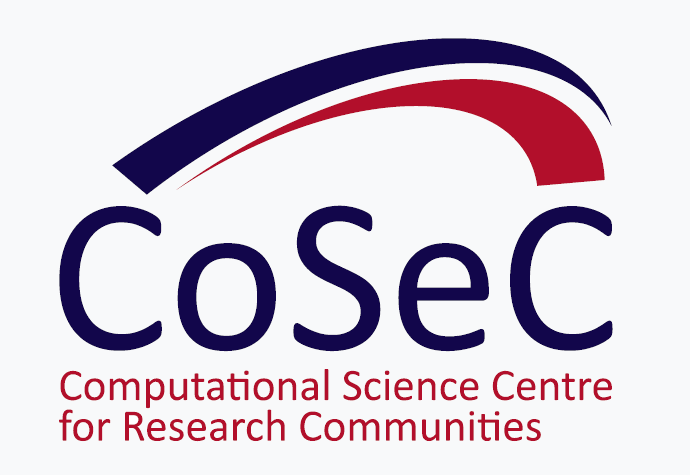Past Events
Venue
2.11 Merchant Venturers Building, Department of Electrical and Electronic Engineering, Woodland Road, Bristol BS8 1UB.
Travel directions are at http://www.bristol.ac.uk/maps/directions/
Please note: Research talks will take place in Lecture Theatre 3 in the School of Chemistry, Cantocks Close, BS8 1TS.
Registration
There is no fee for registering for this workshop. However, participants are responsible for arranging the costs of their own travel and accommodation. We have provided a list of recommended places to stay below, should you need overnight accommodation. To register for this workshop day only please follow this link. Delegates wishing to attend multiple workshop days during this training week must register for those days separately.
Please note: If this is the first time that you have used the STFC event registration system then you will need to createan account before you can register for any of the courses.
Programme
10.00 - 4.00pm Python for Biomodellers and FESetup
1. Introduction to Python for Biomodellers – Instructor: Dr Christopher Woods
2. FESetup – Instructor: Dr Hannes Loeffler
4.30pm - 5.30pm Research talks (examples of the use of Python for biomolecular modelling):
1. Robin Corey - "In silico investigations of protein translocation"
Protein translocation across membranes is a fundamental and essential process, achieved in every cell by the ubiquitous Sec translocon. In bacteria, SecYEG and SecA associate to carry out translocation, powered in part by the trans-membrane proton motive force (PMF). Our ability to understand this mechanism has been hindered by difficulties in examining this process at the atomic level. Now, through use of a Python program which combines molecular dynamics simulation data and pKa-prediction software, we are able to probe this process in unprecedented detail and develop a novel mechanism for PMF-driven protein translocation.
2. Dr Marco Pasi - "Histone-DNA interaction dynamics in nucleosomes with DNA loops"
The position of nucleosomes along chromosomal DNA is a crucial element of gene regulation. Eukaryotes express various "remodelers" that control and modify nucleosome positions, in a process that is believed to involve the formation of DNA loops on the nucleosome core. In particular, the RSC remodeler releases stable modified nucleosomes containing 30-40 base pairs of "extra" DNA (PNAS 2010 107:1936). Our atomic-detail microsecond-scale molecular dynamics simulations of nucleosome DNA loops (> 5e5 atoms) provide a significant improvement over previously employed uniform rod models of DNA. In particular, they reveal that DNA can alleviate bending strain within the loops by localized kinking in order to increase its interaction with the histone core, ultimately forming small loops that are irregularly shaped and asymmetrically positioned. These results propose a new view of loop stability and should lead to reconsider models of chromatin remodelling.
3. Chris Wood - "ISAMBARD: An open-source computational environment for biomolecular analysis, modelling and design"
ISAMBARD, an Intelligent System for Automated Model Building And Rational Design, is a Python-based API built with parametric protein design in mind. It has a range of tools for model building and validation, as well as tools for the analysis of known protein structures allowing this information to be leveraged to inform design processes. These methods allow protein structures to be explored that are not observed in nature, i.e. the “dark matter” of protein-folding space. The latter is a possible source of interesting and new protein folds with potential applications in biotechnology and synthetic biology.
Aimed at: PhD students or Postdocs that are interested in learning some more Python, and how it can be used for biomolecular simulation. The first part of the workshop will provide material at many different levels, so you should be able learn something new if you are a beginner, intermediate user or even an advanced Python programmer.
Requirements: Very basic knowledge of the Linux command line.
Description:
Section 1: Introduction to Python for Biomodellers
This will provide you with instructors and support to work through your choice of one of four self-guided Python workshops:
- Beginning Python - http://chryswoods.com/beginning_python/
- Intermediate Python - http://chryswoods.com/intermediate_python/
- Parallel Programming for Python - http://chryswoods.com/parallel_python/
- Numpy and Matplotlib - http://chris35wills.github.io/courses/PythonPackages_numpy/README_numpy and http://chris35wills.github.io/courses/PythonPackages_matplotlib/README_matplotlib
Section 2: FESetup
We will teach you how to use FESetup, which is written in Python, to automatically set up input files for molecular dynamics simulations and protein-ligand binding free energy calculations.
- Download FESetup.
- Documentation and the tutorials can be found on our Wiki page.
- A draft of the presentation slides is available too.
Contact:
Accommodation
Accommodation is NOT included with your registration for this event. Should you require accommodation (e.g. when attending multiple one-day events), you should make your own arrangements. We can recommend the following:
Clifton House - website - 0117 973 5407
Premier Inn, Haymarket Bristol - website - 0117 910 0600
Victoria Square Hotel - website - 0117 973 9058
Berkeley Square Hotel - website - 0117 925 4000
Contact
For queries related to this days workshop contact:
[add workshop contacts]
For more general workshop queries, contact:
Marc van der Kamp:






